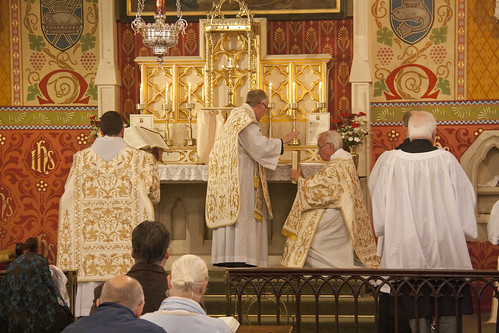 |
| The celebrant blesses the deacon in preparation for the latter's proclamation of the Gospel |
One thing which should alert us to the problems I am going to discuss is Spencer's involvement, as co-founder of the organising group, the American Freedom Defence Initiative, with the Mohammed cartoon event in Texas at which two Muslims got themselves killed. The event, which offered a prize to the best cartoon of Mohammed and displayed the entries, had a predictable result: a murderous protest by a couple of local Muslims. Since the event was well guarded, it was the Muslims who ended up in the morgue; one of the security detail was also injured. This doesn't reflect well on Islam, but I fail to see the moral justification for making this kind of deliberate provocation. The glorification of free speech, and the carelessness about human life, are both very disturbing.
Spencer says that to understand Islam you need to get to grip with the texts which are, by a wide and historically long-standing consensus, regarded as authoritative. (The Koran is surrounded by a massive penumbra of authoritative texts, without which it is often incomprehensible.) Each generation of Muslims who are inspired to take their faith seriously confront these texts, and are drawn into a set of positions which open the way - at least - to the kinds of positions usually identified as 'fundamentalist' and the like. There are also, of course, a far larger number of Muslims who aren't educated in great detail about these texts or their implications, and there are also liberal Muslim theologians who want to explain them away. But it is certainly absurd to say that all the stuff about slaying the enemies of Islam is not 'authentic Islam'. It is there, in these texts.
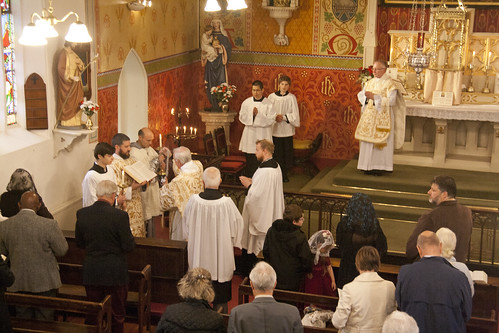 |
| The solemn proclamation of the Gospel of Jesus Christ. |
For example, Spencer contrasts the practice of stoning for adultery recorded in Muslim sources with the story of Jesus saving the Woman taken in Adultery in John 8:1-11. Mohammed was party to the stoning of a woman, who had repented; he then said that her attitude of repentance was acceptable to Allah. This attitude is exactly the same as the historic Catholic attitude to capital punishment: appropriate in certain cases, and giving the criminal a chance to offer the punishment as a penance and achieve salvation. It was of such a case the Shakespeare coined the over-used phrase,
... nothing in his life
Became him like the leaving it (Macbeth).
Ok, so we don't stone adulterers to death; in the early Church they would have been obliged to fast rigorously, wear sackcloth with ashes on their heads, and sit at the entrance to the assembly (not go in) begging for prayers, perhaps for years. Later they might have been flogged. There is nothing in the story of John 8 that suggests Jesus' disapproved of the death penalty in general or for adultery in particular, which is, after all, commanded by Leviticus 20:10. Rejecting the divine inspiration of the Old Testament is the heresy of Marcionism. Rejecting the innerancy of any part of Scripture is contrary to the clear teaching of the Church of every age.
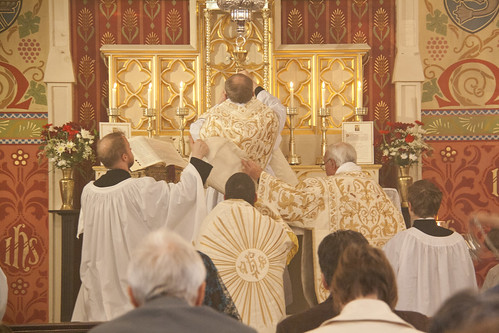 |
| The consecration of the Precious Blood, shed for all mankind by Jesus Christ on the Cross. |
The same of course is true about polygamy, slavery, and killing women and children in a holy war. There are lots of things Catholics can and should say about these issues, and the Tradition helps us to show how they are not part of an ideal or normal state of things. It is open to Spencer to say that Islam doesn't have, or has not historically employed, these kinds of arguments. The contrast with Islam is far more subtle, nevertheless, than the contrast between Islam and today's Western liberalism, and Spencer too often takes the easy route of criticising Islam from the perspective of liberalism rather than of Catholicism. In doing so, he is exposing the Church to the very same criticisms he makes of Islam.
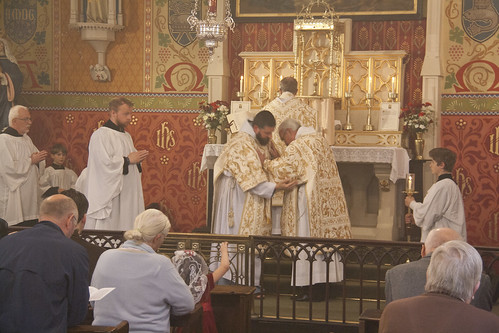 |
| The Peace of Christ, from Christ really present upon the Altar. |
I can only assume that Spencer was having a really bad day when he wrote that. Have a look at the words of Jesus in Matthew 33:37:
(Cf. the Parable of the Tenants.) Oh dear, oh dear. Spencer's accusation of 'incendiary' anti-Semitism boomerangs back onto Our Blessed Lord and Saviour. As Spencer himself explains, much of the content of the Koran takes for granted a knowledge of Jewish and Christian Scriptures, even while correcting them when it deems necessary, so there is no inconsistency in referring to a tradition attested, in this case, in the Gospels. Perhaps Jesus had in mind incidents like the killing of the companions of Elijah by order of Jezebel; perhaps his remark took account of non-canonical Jewish stories like the martyrdom of Isaiah, whose being sawn in half under King Manasseh is a subject found in Christian art. It makes no difference.
Spencer appears to avoid a similar howler only narrowly when talking about the preaching of Noah, attested in the Koran but not in Genesis. After lambasting the Koran for embroidering the story, he suddenly appears to notice that the Jewish tradition that Noah preached repentance to the sinners of his day to save them from the Flood is affirmed in 2 Peter 2:5 (p76), and notes this in parenthesis.
The two most egregious examples, however, found throughout the Spencer ouvre, are those of the separation of Church and State and the place of women in society. There are certainly important differences between the classical Islamic and traditional Catholic positions on these topics. But Spencer ignores these, and instead criticises early Islam for not having anticipated late 20th century Western liberalism by fifteen centuries. I'm sorry, but this is just absurd. Ask St Thomas More or, for that matter, Bl. Charles of Austria, what they thought of the separation of Church and State or the position of women as understood by Western liberalism today, and sit back to watch the fireworks.
Spencer's championing of freedom of speech would have struck these great Catholic statesmen as equally incomprehensible. As I've noted before on this blog, it is a principle which has been consistently opposed by modern Popes; in earlier times, it would have been regarded as so laughable as not to need discussing.
I wish I had the expertise in Islam to make the argument which Spencer fails to make, about the difference between the classical Islamic conception of the role of religion in the state, and what Leo XIII called the 'harmonious union of Church and State'. What I do know is that to say that the American Constitution or - heaven help us - Feminism has grown out of Christianity is like saying that an oak tree has grown out of an abandoned cricket field.
One final point about Spencer's Catholicism. In case readers get the impression he is wedded to a 'Vatican II' perspective, he goes to extraordinary lengths (in Inside Islam) to contradict a statement in Vatican II's Nostra Aetate to the effect that Muslims and Catholics worship the same God. Spencer claims the statement is ambiguous, which is nonsense, partly because it is simply taking for granted something which has never been seriously contested in the Tradition. Of course Muslims worship the same God: 'Allah' is just the Arabic for 'God', it is used in Arabic translations of the Bible and by Arab Catholics. The Koran repeatedly identifies the object of Muslim worship with the God of Abraham and Moses, the God who inspired the Psalms of David, who created the universe and will judge it. Muslims have false beliefs about God, but the reference of the word 'God' would be sufficiently fixed by the fact that they are talking about the Supreme Being.
Reject the possibility of talking about the same being while disagreeing about some of the being's attributes and actions, and the philosophical problems open up at our feet like the Grand Canyon. If you are going to quibble with Nostra Aetate, this is a very strange place to start.
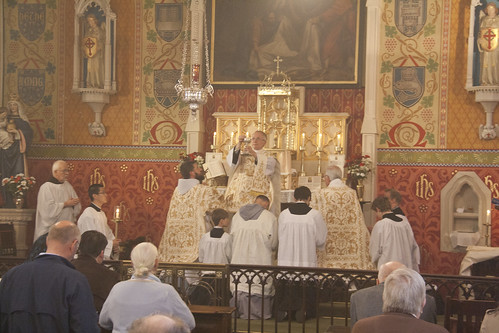 |
| Ecce, Agnus Dei. |
Support the work of the LMS by becoming an 'Anniversary Supporter'.
(Sorry but this may be a repeated comment as I am not sure that it worked the first time.)
ReplyDeleteGratuitously insulting Muslims does put a question mark over Spencer's writings. However I would be interested to know where one can find a balanced view of Islam to-day. I have read Jacques Jornier's "How to Understand Islam" but that was written 26 years ago before the present ructions. It gives a lot of basic information and is worrying in that some of the revisionist Muslim thinkers are apparently very hostile to the West. Tom Holland's "In the Shadow of the Sword" gives a great deal of historical background but left me unable to see the wood for the trees. One curiosity: he does not mention the split between Sunnis and Shiites which I thought occurred early on. I am tempted to buy Ayaan Hirsi Ali's "Heretic" recently reviewed in the Catholic Herald but it is quite expensive.
You say "Rejecting the divine inspiration of the Old Testament is the heresy of Marcionism. Rejecting the innerancy of any part of Scripture is contrary to the clear teaching of the Church of every age." But then how do you deal with the "awkward parts"? Take Joshua for example where God is angry because the Israelites commanded to kill a nation did not kill the women and children. Ronald Knox says that they did not do so as they were taking them as sex-slaves which was worse than killing them. A topical explanation but not entirely convincing.
You also say "Looking at what was going on in Mohammed's time and saying 'Yuck, that's just awful' simply invites the response: take a look at the Old Testament." But surely we can always answer this by saying that the New Testament changed everything. But where is Islam's "New Testament"?
Regarding your question about finding a balanced view on Islam, try "111 Questions on Islam" by Fr. Samir Khalil Samir, S.J. You can get the book either from Amazon or Ignatius Press.
DeleteNicholas: there's no single way of dealing with the hard passages, but a number of ways. For one thing we have to accept that God has the right to take life: there is no injustice in Abraham killing Isaac if God commanded it. But this and the holy war passages are very specific: there's no blanket permission to kill. Similarly with polygamy, it was permitted for a specific time and place. This is the approach you find in ancient and medieval commentaries.
ReplyDeleteThe Holy War stuff can also be seen as symbolic of course. It highlights not the bloodthirsty nature of the war but the *failure* of the Israelites to make a clean break with Canaanite paganism. The point of the theme in these books is that they did *not* carry it out.
Saying it is a load of nonsense and abrogated by the NT isn't on. For one thing, where does Jesus reject the OT? He says rather 'Scripture cannot be set aside' (John 10:35).
Actually I did not say it was a load of nonsense and you yourself used the word 'abrogate': " the juridicial commands of the Old Testament are not binding since the revelation of the New Law; they have been abrogated."
DeleteI wondered about that as to whether you are making a distinction between juridical commands and others and if so how you do it.
My saying that the 'New Testament changed everything' was unfortunate. My understanding is that Jesus completed the law. As to the OT I can accept divine inspiration but 'inerrancy' seems to be taking matters a bit too far. It suggests literal truth of every word. The word does not appear in 'Dei Verbum' and the closest it gets to it is in para 11: "Therefore, since everything asserted by the inspired authors or sacred writers must be held to be asserted by the Holy Spirit, it follows that the books of Scripture must be acknowledged as teaching solidly, faithfully and without error that truth which God wanted put into sacred writings for the sake of salvation." This seems to me a very much more limited assertion. I note however that Archbishop Chaput mentions 'inerrant' in the CTS introduction to DV.
I didn't say you did say that.
DeleteJuridical commands are abrogated but these are not juridical commands; they aren't commands about the application of criminal justice. Like juridical commands, however, they apply only to specific people at specific times.
Inerrancy is the constant teaching of the Church. Scripture must be understood according to the genre employed; it is a matter of what it 'asserts', as Dei Verbum puts it. The Parables don't assert things about history, for example. I don't think the Book of Esther does either.
The teaching is clearer in Dei Filius in Vatican I. That hasn't been abrogated...
"Muslims have false beliefs about God, but the reference of the word 'God' would be sufficiently fixed by the fact that they are talking about the Supreme Being."
ReplyDeleteBut isn't the question more complex than this, given the simplicity of God? St Thomas held that when an object of thought is purely simple, then to be wrong about it in any respect is no longer to be thinking about it. This is from Summa contra Gentiles III, 118:
"Besides, whoever is in error regarding something that is of the essence of a thing does not know that thing. Thus, if someone understood irrational animal with the notion that it is a man, he would not know man. Now, it would be a different matter if he erred concerning one of man’s accidents. However, in the case of composite beings, the person who is in error concerning one of their essential principles does know the thing, in a relative way, though he does not know it in an unqualified sense. For instance, he who thinks that man is an irrational animal knows him according to his genus. But this cannot happen in reference to simple beings; instead, any error at all completely excludes knowledge of the being. Now, God is most simple. So, whoever is in error concerning God does not know God, just as the man who thinks that God is a body does not know God at all, but grasps something else in place of God." Islam seems to deny the attribute of love to the divine nature, and it certainly denies the attribute of communicability.
It would seem to follow that any theological disagreement about the nature of God would result in a failure of reference. But that is surely absurd. We can easily fall into error about something implied by God's being.
DeleteJoseph in my missal the Church prays for muslims under the label of idolatry. I think you are reading more than what is there in the poorly worded document. It does not use the word "same" but "one". I was told that this choice was significant in that it allows you to claim their idol has some positive aspects that are similar to revealed Truth.
DeleteI have read most of the Koran I cannot agree you are correct in making this statement
"The Koran repeatedly identifies the object of Muslim worship with the God of Abraham and Moses, the God who inspired the Psalms of David, who created the universe and will judge it."
The fact of the matter is Koran falsifies the revealed truth and then claims identity to the falsified rewrite as if it were revealed truth. This is like falsifying the doctrines of the Catholic Church and then claiming an identity with Catholicism on the grounds of adherence to your falsified doctrines.
Is it clear that this would be absurd? It wouldn't mean that anyone who said something about a subject called 'God' which does not apply to God thereby became an idolater or an atheist; simply that at the moment of completing his enunciation he was no longer thinking about God, since the thought of the predicate is incompatible with the thought of God.
ReplyDeleteWhat if a group of pacific islanders worshipped a giant tortoise as the supreme being?
I don't follow you on John 8 1-11. Are you saying it was a one-off and not meant by Jesus to be normative? Or that it is rather unusual for executioners (or their employers) to be sinners?
ReplyDeleteWhat is unusual is for there to be present at an execution the Sinless One who is ready to pay the price for sins, and has the authority to forgive sins.
DeleteAnother query: if you believe that Spencer and his AFDI bear a share of the moral responsibility for the attempt to kill them, would you similarly say that Pope Benedict was responsible for the violent reactions to his Regensburg lecture?
ReplyDeleteDid Pope Benedict expect that to happen?
Delete